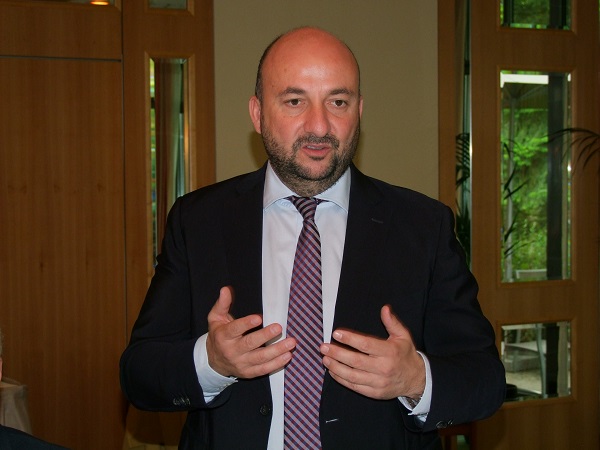
On Monday lunchtime, Nobelux and Swebelux held a Get Together luncheon at the Hotel Parc Belair in Luxembourg city, with Deputy Prime Minister and Minister for the Economy, Etiennce Schneider, as guest speaker.
Introduced by Michel Maquil of the Nordic chambers of commerce, Minister Schneider addressed the topic of "Challenges facing the Luxembourg economy". He said that the growth rate last year was 5% and this year is estimated at 3.8%, which he decsribed as fantastic, while also acknowledging that the Statec forecast is normally conservative.
The Unemployment rate in Luxembourg is still falling and is expected to drop below 6% in two years' time. Last year, Luxembourg created 14,000 new jobs. Currently there are 17,000 unemployed, with many have little or no education, with an education programme in place to train people to work in the logistics sector.
The public finances are now under control; the previous government saw the national debt tripling; the current government has not taken on any loans and the debt ratio is now down to 23% of GDP which will not change during the current government's legislative period, but they will borrow for investments. He explained that the government has implemented 258 different measures.
One of the next projects is tax reform which will give back 1% to companies in order to increase the purchasing power of individuals and increase tax benefits for companies when investing. Much investment into infrastructure has been made in Luxembourg, with 3-5% investment leading to the country's economy returning to growth.
He talked about the green economy, based on the circular economy, which is employing 2,000 people here now, and Biotech is still investing with more researchers and developers coming to Luxembourg.
Ten years ago Luxembourg was nowhere in the ICT business and a huge investment was decided upon to upgrade the infrastrcuture, with the P&T (and subsequently LuxConnect) investing heavily in ICT infrastructure, including in datacenters. Luxembourg is now active in different domains of the ICT business, and has launched an initiative in high-performance computing (HPC), leading a project also involving other countries.
The automotive and space resources sectors are also growing fast, with 4-5,000 new jobs expected in the automotive sector in the next couple of year, of which 1,700 will be based at Goodyear in Colmar-Berg. In the space sector, there are now 30 companies active in Luxembourg, many of which are working with SES in Betzdorf.
The Logistics sector has 13,000 people employed, with the new infrastructure in Bettembourg almost ready for operation; many international companies are deciding to set up a base in Luxembourg.
On the space mining issue, many countries and companies are trying to work out how to be active in these areas. Minister Schneider explained that there is no international legal basis for space exploration, with the US Congress looking at it from the perspective of deep sea fishing, i.e. where you can take the fish but not own the ocean; in space mining, you cannot own an asteroid but you can take its resources. Companies active in R&D in space do not need that much money yet but when they start to launch rockets, etc., they will need a lot of financial resources in the long term. So, in the short term, there will not be many jobs here, but Luxembourg's planning is for the long-term.
Back to earth, he explained the strategy launched with Jeremy Rifkin about transforing the economy into a renewable economy, within the concept of the 4th industrial revolution, with a strategy expected to be developed. He also talked about the merger of Luxembourg for Business with Luxinnovation which started at the level of trade missions.
He also explained that the legal framework continnually needs to be reviewed in order to sustain a high growth rate.
On the topic of electric vehicles, he said that Luxembourg wants to become a test-bed for autonomous driving. To achieve this one needs sensors everywhere, and one needs different test beds. He acknowledged that one of the issues is the question of insurance and liability, but Luxembourg wants to take the lead in this area.
On the issue of Brexit and the UK's referendum on 23 June, he said that it would be the beginning of the end for the European Union as we know it, with other Member States expect to hold their own referenda if Britain votes to leave. If Brexit does happen, the leaving process will take a long time and he expects it would be a disaster for the economy of the UK. He would also expect many financial institutions currently in London would then move to Luxembourg, which would cause additional headaches and challenges here, including the issue of sourcing real estate, both office and residential.
Photo by Geoff Thompson: Deputy PM and Minister for Finance, Etienne Schneider









